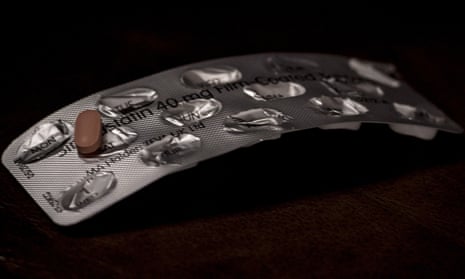Statins do not commonly cause muscle pain, the world’s most comprehensive study of their risks has found, prompting health experts to reassure millions of patients that taking the pills is safe.
The drugs are widely prescribed to prevent heart disease, but there have been concerns for years that they may frequently cause muscle pain or weakness.
Now a study presented at the European Society of Cardiology Congress in Barcelona and published in the Lancet in effect debunks that belief.
“The idea that statins may cause frequent muscle pain has been a persistent belief among some patients and clinicians. However, our study confirms that the statin is rarely the cause of muscle pain in those taking statins,” said Prof Colin Baigent, the director of the Medical Research Council’s population health research unit at the University of Oxford, and joint lead author of the study.
“These findings suggest that if a patient on statins reports muscle pain, then it should first be assumed that the symptoms are not due to the statin and are most likely due to other causes.”
Statins are one of the most commonly prescribed drugs. Eight million people in the UK take them, as do millions more globally.
“Drug regulators around the world are concerned to keep patients safe,” said Baigent. “And up until now they’ve thought that doing that is best served by having these warnings about the possibility of muscle pain.
“What we’ve shown is actually that that’s not the best way to serve patients, because patients take that information and the moment they develop muscle pain they suspect the statin and that leads many of them to stop the statin, which actually puts them in harm’s way.
“And so we’ve got to try to change the balance of that, and work with the regulators to do a better job of communicating the risks.”
A data analysis covering 155,000 patients from 23 trials of statins found that when a patient reported muscle symptoms while taking a statin, there was a less than 10% chance that the pain was caused by the drug. It also suggested that the small increased risk of muscle symptoms was mostly observed within the first year of treatment.
Prof Sir Nilesh Samani, the medical director at the British Heart Foundation, which co-funded the study, said: “This accumulation of data from many clinical trials provides a clear picture that while statins are associated with a small increase in risk of muscle pains or weakness, they do not cause the majority of muscle pain symptoms commonly associated with them.
“It reinforces the evidence that statins are safe, which should provide reassurance to the many people taking, or considering taking, these life-saving drugs that have been proven to protect against heart attacks and strokes.”
After the first year of the 23 trials there was no significant increase in the risk of reporting muscle pain. The researchers said the risk of muscle symptoms caused by statins should be considered alongside the cardiovascular benefits of the therapy.
after newsletter promotion
Given the findings, they are calling for a review of the recommended strategies for managing muscle pain during statin use, and for the information on the labels for the drug to be revised.
Dr Christina Reith, a senior clinical research fellow at Oxford Population Health and joint lead author of the study, said: “We hope that these results will help doctors and patients to make informed decisions about whether to start or remain on statin therapy, bearing in mind its known significant benefits in reducing the risk of cardiovascular disease.”
The study found that among 19 clinical trials that also involved people being given a placebo, 27.1% of patients who were given statins reported muscle pain or weakness, compared with 26.6% of those who were given the placebo.
After the first year of treatment there was no significant difference in reports of muscle pain or weakness between those given statins and those given the placebo, the study found.
The Oxford researchers stressed that if patients experienced muscle symptoms they should tell their GP, and they also acknowledged that in very rare cases the drug can cause quite serious muscle damage.









